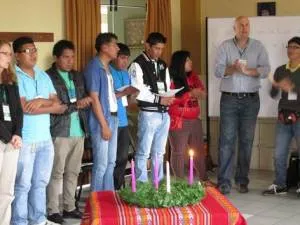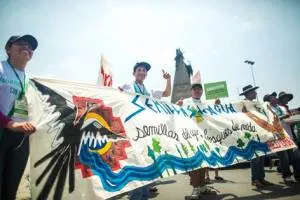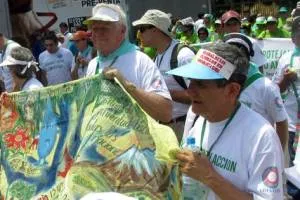Climate Justice
A letter from Sarah Henken serving as Regional Liaison for the Andean Region, based in Colombia
The sun was bright and spirits were high as we took our place in line. Standing on tiptoe, I couldn’t see the start of the crowd gathered in the street. Later I would learn that there were about 20,000 of us participating in the people’s march for climate justice. We were a motley crew: young and old, drummers and dancers, of different political and spiritual stripes, from many countries and nations around the world, including our group of almost 60, U.S. Presbyterians and partners from Bolivia and Peru. The atmosphere was more like a parade than a protest as we moved through the streets of Lima, sharing our hope for change with the people who stood on the sidelines to gawk or to encourage us. Our message to the world’s lawmakers was simple: let’s change the system, not the climate.
But the fruit of the Spirit is love, joy, peace, patience, kindness, goodness, faithfulness, gentleness, and self-control. There is no law against things like this (Galatians 5:22-23).

To provide a little background: UN member countries were invited in 1992 to sign the United Nations Framework Convention on Climate Change, and since 1995 there has been an annual “Conference of the Parties” (COP) meeting to discuss ways to limit average global temperature increases and greenhouse gas emissions. The 20th of these meetings, COP20, was held in Lima in December 2014, and I was there with other Presbyterians and partners from the global church as part of a “people’s summit” held in the same time and place. View a ">short video clip, or longer video from the ">PC(USA) Climate Change Peru Trip 2014, to get a sense of what Peruvians are facing now and in the near future.
We had gathered to dig deeper into the issue of climate change. We witnessed firsthand the consequences and listened to those most vulnerable to its effects. We lent our voices on behalf of the global church as part of civil society’s call for changing the system instead of the climate.
In a welcome session with the delegation we heard from Nelson Figueroa, a member of the Joining Hands Peru board who works with teens on the outskirts of Lima. He shared a basic tool of consciousness-raising he uses to get them thinking and help them identify problems and a plan of action:
1. What is happening?
2. Why is it happening?
3. How should we respond?
Our faith can stir us to action, but it can also leave us in complacency. God created and continues to shape and sustain heaven and earth, all that we can ever see or touch or know. God makes beauty and works miracles. We pray for divine intervention in the face of climate crisis, but are we willing to be part of God’s action for transformation?

Nelson said, “The miracle happens through our attitude and our actions.” God acts through us and many others like us who are actively engaged in changing the systems that are harming the earth. We need many more thousands, millions of people to become aware of the urgency and to be willing to make meaningful and sometimes difficult changes in the way we live and interact with God’s creation.
Participants in the Presbyterian delegation drafted a joint statement together with youth from the Joining Hands networks in Peru and Bolivia. It outlines a faithful response that promotes climate justice. International agreements and governmental policies and actions are necessary components of the changes we need, but they are not the only piece. As Jed Koball, PC(USA) mission co-worker in Peru, puts it: “Any meaningful attempt to address climate change begins with our own attitudes—our own daily actions and commitment to changing the way we live. Until we as a human race demonstrate the individual will to adapt to a new lifestyle, our governments will fail to find the political will to make the necessary and difficult decisions that our partners and neighbors are calling for.”
The changes we need may require significant discomfort and disruption of our routine, but we must resist complacency because the situation is urgent and the time to act is now. As the delegation statement says, “Climate change poses unprecedented, unjust peril that affects the most vulnerable populations.” Those vulnerable populations include friends we know through our connections in God’s mission, they are sisters and brothers in Christ. While we were in Peru I visited some of them with PC(USA) General Assembly Moderator Heath Rada, his wife Peggy, and Sara Lisherness, director of the PC(USA)’s Compassion Peace and Justice ministry.

After worship we sat in Pastor Robinson’s living room. He told us that the community is strong, porque somos gente que espera. We are people who hope, he said. And wait. And work.
People who work hard so their children can study and have greater opportunities in life. Who build dwellings and businesses on sandy slopes overlooking the sea. Many will travel long hours south to Lima for work each day. Diverse economic and environmental factors make life elsewhere untenable for them, and so they eke out a living in this beautiful, inhospitable place.
They live in hope for a better future, and their waiting time is a things-to-do time.
My body, burned by the sun, will sweat;
my hands will become calloused,
my feet will learn the mystery of the paths,
my ears will hear more,
my eyes will see what they did not see before,
while I am waiting for you.
I won’t await you only waiting,
for my waiting time is
a things-to-do time.
Pastor Robinson’s community already feels the effects of climate change. They are living on the edge. Are we ready to join them in hard, hopeful work?
There is much to do, and it will take the concerted effort of all of us, together. I hope you will take a look at the statement issued by the delegation and consider taking some of the action steps recommended by our Environmental Ministries Office. Thank you for all you have done and all you will do to promote the fullness of life that God desires for all creation.
The Lord now sends us forth
with hands to serve and give,
to make of all the earth
a better place to live.
The angels are not sent
into our world of pain
to do what we were meant
to do in Jesus' name;
that falls to you and me
and all who are made free.
Help us, O Lord, we pray,
to do your will today.
Grace and peace to you.
Sarah
The 2014 Presbyterian Mission Yearbook for Prayer & Study, p. 35
The 2015 Presbyterian Mission Yearbook for Prayer & Study, p. 44
